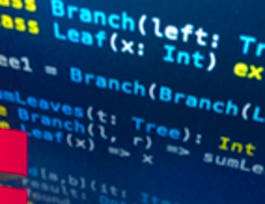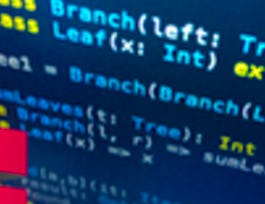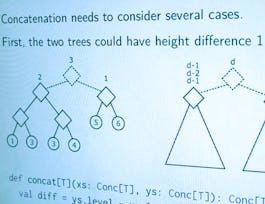In this course you will learn how to apply the functional programming style in the design of larger Scala applications. You'll get to know important new functional programming concepts, from lazy evaluation to structuring your libraries using monads. We'll work on larger and more involved examples, from state space exploration to random testing to discrete circuit simulators. You’ll also learn some best practices on how to write good Scala code in the real world. Finally, you will learn how to leverage the ability of the compiler to infer values from types.


Functional Program Design in Scala
This course is part of Functional Programming in Scala Specialization
Taught in English
Some content may not be translated

Instructor: Martin Odersky
60,658 already enrolled
Included with 
Course
(3,130 reviews)
89%
What you'll learn
Recognize and apply design principles of functional programs
Design functional libraries and their APIs
Write simple functional reactive applications
Understand reasoning techniques for programs that combine functions and state
Skills you'll gain
Details to know

Add to your LinkedIn profile
3 quizzes
Course
(3,130 reviews)
89%
See how employees at top companies are mastering in-demand skills

Build your subject-matter expertise
- Learn new concepts from industry experts
- Gain a foundational understanding of a subject or tool
- Develop job-relevant skills with hands-on projects
- Earn a shareable career certificate


Earn a career certificate
Add this credential to your LinkedIn profile, resume, or CV
Share it on social media and in your performance review

There are 5 modules in this course
We'll start by revisiting some concepts that we have learned from Principles of Functional Programming in Scala; collections, pattern matching, and functions. We'll then touch on for-comprehensions, a powerful way in Scala to traverse a list, process it, and return a new list. We'll see how to do queries with for-comprehensions as well as how the for-comprehension is "desugared" into calls to higher-order functions by the Scala compiler. Finally, we'll discuss what monads are, and how to verify that the monad laws are satisfied for a number of examples.
What's included
8 videos8 readings3 programming assignments
This week we'll revisit performance issues caused by combinatorial search, and we'll discover an important concept in functional programming that can address these issues: laziness. We'll also learn a little bit about proofs on trees; in particular, we'll see how to extend structural induction to trees.
What's included
6 videos2 programming assignments
This week, we’ll learn how to make the compiler write programs for us! We’ll see how the compiler can summon program fragments based on their type and how this mechanism can be used to implement a new form of polymorphism (type classes).
What's included
7 videos5 readings3 quizzes2 programming assignments
This week, we'll learn about state and side-effects. Through a rich example, we'll learn programming patterns for managing state in larger programs. We'll also learn about for-loops and while-loops in Scala.
What's included
5 videos
This week we'll learn a number of important programming patterns via examples, starting with the observer pattern, and then going on to functional reactive programming.
What's included
6 videos2 programming assignments
Instructor

Offered by
Recommended if you're interested in Software Development

École Polytechnique Fédérale de Lausanne

École Polytechnique Fédérale de Lausanne

École Polytechnique Fédérale de Lausanne

École Polytechnique Fédérale de Lausanne
Why people choose Coursera for their career




Learner reviews
Showing 3 of 3130
3,130 reviews
- 5 stars
66.32%
- 4 stars
24.03%
- 3 stars
7.56%
- 2 stars
1.62%
- 1 star
0.44%
New to Software Development? Start here.

Open new doors with Coursera Plus
Unlimited access to 7,000+ world-class courses, hands-on projects, and job-ready certificate programs - all included in your subscription
Advance your career with an online degree
Earn a degree from world-class universities - 100% online
Join over 3,400 global companies that choose Coursera for Business
Upskill your employees to excel in the digital economy
Frequently asked questions
Access to lectures and assignments depends on your type of enrollment. If you take a course in audit mode, you will be able to see most course materials for free. To access graded assignments and to earn a Certificate, you will need to purchase the Certificate experience, during or after your audit. If you don't see the audit option:
The course may not offer an audit option. You can try a Free Trial instead, or apply for Financial Aid.
The course may offer 'Full Course, No Certificate' instead. This option lets you see all course materials, submit required assessments, and get a final grade. This also means that you will not be able to purchase a Certificate experience.
When you enroll in the course, you get access to all of the courses in the Specialization, and you earn a certificate when you complete the work. Your electronic Certificate will be added to your Accomplishments page - from there, you can print your Certificate or add it to your LinkedIn profile. If you only want to read and view the course content, you can audit the course for free.
If you subscribed, you get a 7-day free trial during which you can cancel at no penalty. After that, we don’t give refunds, but you can cancel your subscription at any time. See our full refund policy.

